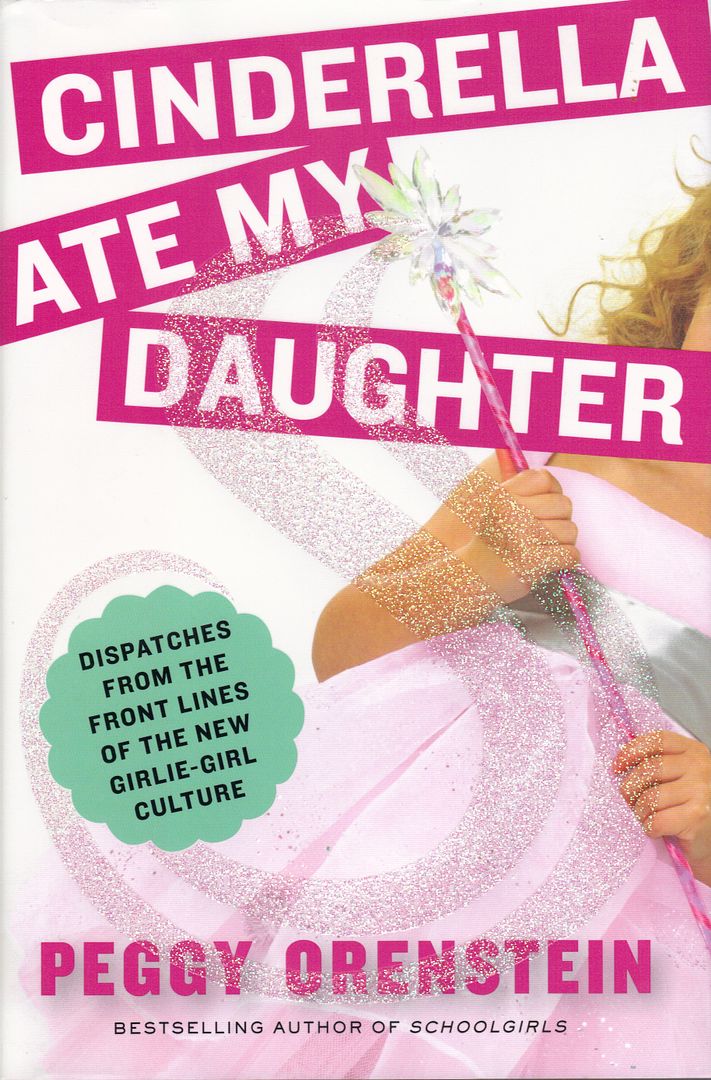 Title: Cinderella Ate My Daughter
Title: Cinderella Ate My DaughterAuthor: Peggy Orenstein
Publisher: Harper, 2011
244 pages
Summary from goodreads.com: The acclaimed author of the groundbreaking bestseller Schoolgirls reveals the dark side of pink and pretty: the rise of the girlie-girl, she warns, is not that innocent.
Pink and pretty or predatory and hardened, sexualized girlhood influences our daughters from infancy onward, telling them that how a girl looks matters more than who she is. Somewhere between the exhilarating rise of Girl Power in the 1990s and today, the pursuit of physical perfection has been recast as a source—the source—of female empowerment. And commercialization has spread the message faster and farther, reaching girls at ever-younger ages.
But, realistically, how many times can you say no when your daughter begs for a pint-size wedding gown or the latest Hannah Montana CD? And how dangerous is pink and pretty anyway—especially given girls' successes in the classroom and on the playing field? Being a princess is just make-believe, after all; eventually they grow out of it. Or do they? Does playing Cinderella shield girls from early sexualization—or prime them for it? Could today's little princess become tomorrow's sexting teen? And what if she does? Would that make her in charge of her sexuality—or an unwitting captive to it?
Those questions hit home with Peggy Orenstein, so she went sleuthing. She visited Disneyland and the international toy fair, trolled American Girl Place and Pottery Barn Kids, and met beauty pageant parents with preschoolers tricked out like Vegas showgirls. She dissected the science, created an online avatar, and parsed the original fairy tales. The stakes turn out to be higher than she—or we—ever imagined: nothing less than the health, development, and futures of our girls. From premature sexualization to the risk of depression to rising rates of narcissism, the potential negative impact of this new girlie-girl culture is undeniable—yet armed with awareness and recognition, parents can effectively counterbalance its influence in their daughters' lives.
Cinderella Ate My Daughter is a must-read for anyone who cares about girls, and for parents helping their daughters navigate the rocky road to adulthood.
* My 5 year-old daughter is a girlie-girl. She loves all things pink and princess. I think that is what drew me to this book. I will agree with Orenstein, in that there is definitely an overcommercialization of the Disney Princesses. Every time you turn around there's a new Princess logoed item on store shelves. And I have to admit that I've helped support the commercialization. Our house is littered with dress-up clothes, lip gloss, and dolls all from the Disney Princess line.
And I don't really have much of a choice as to whether I want to introduce my daughter to some of the tween pop icons or even the Disney Princesses for that matter. My daughter was 3 1/2 and we were in the grocery store when she noticed a display and said, "there's Hannah Mobanna!" I didn't understand what she was saying but looked where she was pointing. "Oh, Hannah Montana! How do you know who Hannah Montana is?" She explained that a girl in her daycare/preschool has a Hannah Montana bag. That particular girl also has an older sister. Going back to the whole merchandising of popular characters, our daughters will and are being exposed to it all around them. Whether it's classmates or just shopping in the store, it's all around.
For now, I say, let my daughter enjoy her princess phase. When I ask her what she wants to be when she grows up, she tells me a teacher (we'll need to talk about that one!) and a doctor. She doesn't tell me she wants to be a princess when she grows up. While Orenstein's reading her daughter the original Grimm's fairy tales, I'd rather not introduce my daughter to the grisliness of those stories for now. There's plenty of age appropriate literature with strong female characters. I say let my daughter believe in fairy tales and happy endings for now. I think she'll find out on her own, way too soon, that that's not "real life".
I think the message of Orenstein's book is summed up in the last line. We should help our daughters, "see themselves from the inside out rather than outside in, we will go a long way toward helping them find their true happily-ever-afters." Unfortunately, I didn't have to read 192 pages to realize this. I think that's what every parent strives for. Regardless of what is being merchandised to our daughters, ultimately, I believe it's the parenting skills that will determine determine the futures of our daughters. We can't necessarily control our daughters' exposure to things, but we can limit it and have important discussions about it.
Overall rating: thumbs down.
No comments:
Post a Comment